Wellington bomber HF613 near Castleton, Derbyshire
‹ Return to Air Crash Sites
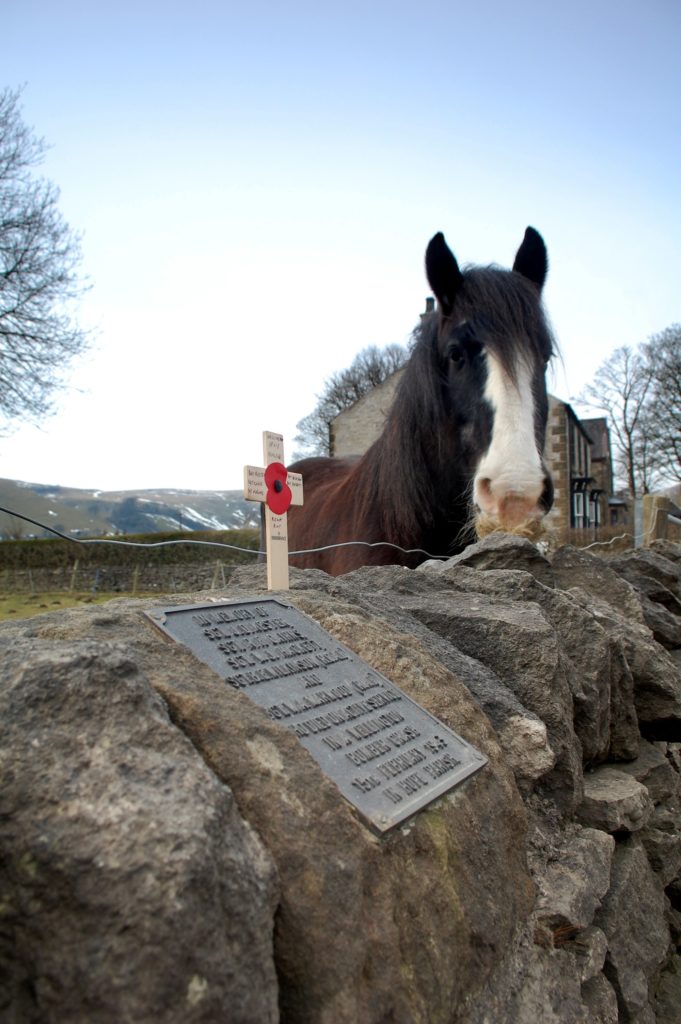
Wellington bomber HF613 near Castleton, Derbyshire
15 February 1943
Wellington HF613 took off from a satellite base of RAF Wellesbourne Mountford which is near Stratford and was home to No 22 Operational Training Unit.
The largely Canadian crew were on a cross country navigation exercise with the pilot, Sergeant Kester warned to keep an eye out for and not to enter storm clouds.
80 miles north of their base and over the Hope Valley in the Peak District, the bomber did just that although whether Sgt Kester had any choice in the matter is another thing.
Eye witnesses interviewed by Pat Cunningham in 2006 said they heard the bomber approach from Bradwell, flew over the cement works then it sounded like it was trying to turn around.
What happened inside that storm cloud can never be known, but Cunningham suggests the pilot, with just 22 hours solo experience of flying Wellingtons, was suddenly having to go from visual flying to relying on instruments – in a cockpit suddenly darkened by the storm and with updrafts and turbulence to cope with as well.
Moments later the Wellington went into a powered dive, crashing 1km east of the village of Castleton at Peakshole Water, killing all on board.
This memorial plaque is placed close to the impact point. There is a young Canadian Maple tree planted beside it.
CREW
Sgt John Douglas Kester, RCAF, pilot
Sgt Richard Foote Cairns, RCAF, navigator
Sgt Bernard Elliott Wilkinson, RCAF, bomb aimer
Sgt William Arthur Billy Marwood, RAFVR, wireless op / air gunner
Sgt William James Hackett, RCAF, air gunner.
Below;
Another Canadian crewed Wellington of 22 OTU and based at Wellesbourne Mountford – MF 509 – crashed in the Brecon Beacons in South Wales in 1944.
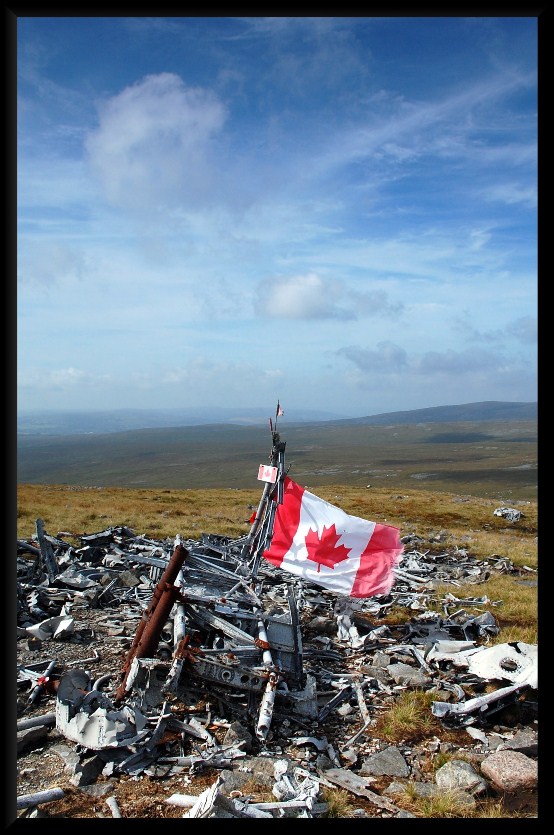
Below;
A photo of a pilot and co-pilot in the cockpit of their Wellington bomber. Photographed by Cecil Beaton in 1941 probably at RAF Mildenhall.
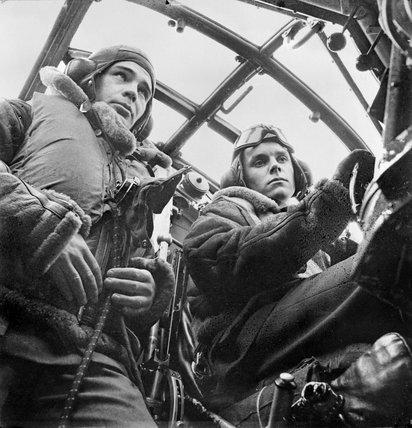
Used with IWM Non-commercial licence
www.iwm.org.uk/collections/item/object/205125098
40 comments on “Wellington bomber HF613 near Castleton, Derbyshire”
Leave a Reply Cancel reply
Image Information
-
Full Size: 2000×3008px
Aperture: f/8
Focal Length: 18mm
ISO: 200
Shutter: 1/100 sec
Camera: NIKON D40

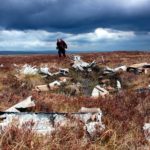
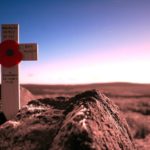
The story of my uncle, Bernard Wilkinson, was just forwarded by my sister. I have see a picture of the plaque be I don’t recall ever hearing the details of the story. From the Canadian Wilkinson family, thank you for your research
Many thanks for your comment, glad to be of assistance!
Ian
Nicely done Ian….here is a photo of Ian taking of from Wellsbourne.

[http://www.flickr.com/photos/tupperware_pilot]
Yay, thanks mate! Nice one.
Excellent work..
Nice shot and history Ian, the horse looks very inquisitive.
If it weren’t so poignant I’d be tempted to ask if you got your details straight from that equine’s mouth
[http://www.flickr.com/photos/gastephen] Lol. Very good.
[http://www.flickr.com/photos/stiemer] He wanted food. But got none, I’m afraid.
[http://www.flickr.com/photos/nondesigner] Thanks Malcolm.
You dont often have such an audience while you are taking your pics.
I have probably driven past this site countless times so will have to look out for it.
Wonderful story!
Beautiful horse btw. He’s my kinda horse
So sad all those young lifes…..good info !!
I think those young men would be glad to have such a fine horse to visit them regularly. But isn’t war just such a complete waste of lives?
Another very poignant reminder of the lives lost during war. Beautiful horse.
great to have company at such a location. that horse has such wonderful doe-ful eyes, very nice against the poppy too. sad story, so few hours on type and in IMC not many would last. it is heartwarming to hear a Canadian Maple is planted as a memorial here.
… the powered dive: when flying IMC one thing pilots are trained on are ‘sensory illusions’ in that, the inner ear which controls our balance and along with nerve endings detect our natural position on the ground and assist us in maintaining [right way up] [also what is affected after a few to many drinks] … in the air, the body gets it wrong. pilots then are taught to fully trust the instruments as they are air environment specific. even an instinctive reaction will be wrong. i think, even in WWII however, cockpit/ instrument ergonomics and training were nowhere near fully understood.
this explains it better: spatial disorientation – vestibular if you are interested .. there is also a visual illusions clip.
Another interesting story. Nice of that horse to come and pose for you! :~}
Lovely work Ian..yet again another reminder of how lucky we are these days..
You do these so well Ian. I bet that old horse’s ears have pricked up sometimes at the sounds of that young crew ‘chatting’ about the lives they had. Such a shame they ended that way and it makes you wonder what the % of fatalities in wartime training was to those combat related? It must have been fairly high and whilst these magnificent young men all went through the various training courses, none of them really had ‘years’ of flying experience to draw upon in such situations. [http://www.flickr.com/photos/angwickham] Ang’s spatial info is very real here too and it must have been very difficult for crews to adjust sometimes, unfamiliar terrain, weather, let alone maybe changing aeroplanes at the last minute etc. Very sad
Lovely touch that maple tree…. recently planted too, which is nice as well, as clearly someone cares enough to remember such a tragic accident.
Hope you had an apple for the horse….
Terrific work Ian . and the horse lightens the mood a little too .
A sad event as ever .
So many people pass by so close to this place and very few will even see the plaque let alone pay respects .
The horse was a very friendly one and seemed to not mind us having nothing for it to eat . A good old nose rub seemed to satisfy it .
Will have alook for the plaque next time I’m up there ian , interesting story again ian
Again, super work Ian … and what a super image to commemorate
good work Ian,did you get the winner for the National from him ?
Brave souls
This nice looking fellow standing behind the stone wall certainly brings some light into the sad mood of this photo.
Interesting story Ian and so wonderful of the horse to come along and pose for you LOL
Have a great weekend :))
William Marwood, always known as Bill, was my mothers brother. He came from Radcliffe-on-Trent, east of Nottingham.
Hi Tessa, thanks for visiting and taking the time to comment. Good to hear from you and to remember your Uncle Bill.
William Marwood was my grandmas nephew ,Uncles Vins son .My grandma was Mabel Marwood (Huddlestone)
Bernard (Bunny) Elliott Wilkinson was my uncle and I came across this page researching my family history. We will be staying near to Edale and Hope next year for a weekend and I would love to visit this plaque. Could you pinpoint the exact spot for me?
Hi Jean,
The actual impact point is at grid reference SK 16179 83030 which is south of the memorial tablet. You can reach the impact point by taking the footpath out of Castleton towards Hope, it is a short stroll along Peakshole Water.
On this Google map you can see a crescent shaped feature of the landscape at the centre of the map? The crash site is at the western end of that crescent, in a field between the stream and the footpath.
https://www.google.co.uk/maps/@53.3441538,-1.7585395,218m/data=!3m1!1e3
On this street view map the monument is just visible in the wall with the planted tree right behind it.
https://www.google.co.uk/maps/@53.3474018,-1.7609873,3a,60y,175.26h,62.73t/data=!3m4!1e1!3m2!1sZq5dXl_zMnH35gMIoPcJ2A!2e0
Please let me know if you have any difficulties identifying the spot.
Ian
Thanks so much for your help. I am sure we will be able to find it. It will mean a lot to my Canadian cousins
Regards
Jean
Saw the plaque during a recent walk whilst staying at caravan club site in Castleton. Very moved by names and history just read and felt real closeness to young men gone too soon whilst stood reading names at site and Canadian maple growing strong.
Thanks to all for info and family links, will visit site again when in the area. Regards to all.
P.S. my father was an instrument mechanic with spitfires from 1939 to 1944
Thanks Geoff. It’s good when the local people create memorials such as this one to lost aircrews.
The plaque was paid for and put in place by Mr. Robinson a lovely old Castleton resident who lived with his wife in a bungalow nearby. He was a real gentleman, I fondly remember having lunch with him and his wife and a relative of one of the Canadian crew members who we afterwards took to the crash site.
Thanks for that detail Steve. Love seeing memorials to crews, generally there is nothing to remember them.
Details and photos of the crew members are on the Canadian Virtual War Memorial page,which can be accessed direct or through another excellent page: http://www.buxtonwarmemorials.co.uk/canadians.html
thanks Paul
Hi Ian,
I am a nephew of Crew member B.E (Bernard) Wilkinson. I am very impressed and touched by your work and the tributes from you and all of the people above, to all of the young men that lost their lives so far away from home. I have just discovered your work here. I was going through memorabilia today and wanted to search for information on my Uncle Bunny and came across this.
Thank you so much for your work and also to all of the people above who left a tribute. Visiting this location and the plot my Uncle in Warrington Cemetery is a trip I hope to make in the near future.
Regards,
Ken Wilkinson
Saskatoon, SK.
Canada
Hi Ken, thank you for your kind words. I hope you get to the UK one day soon to pay your respects in person.
Ian